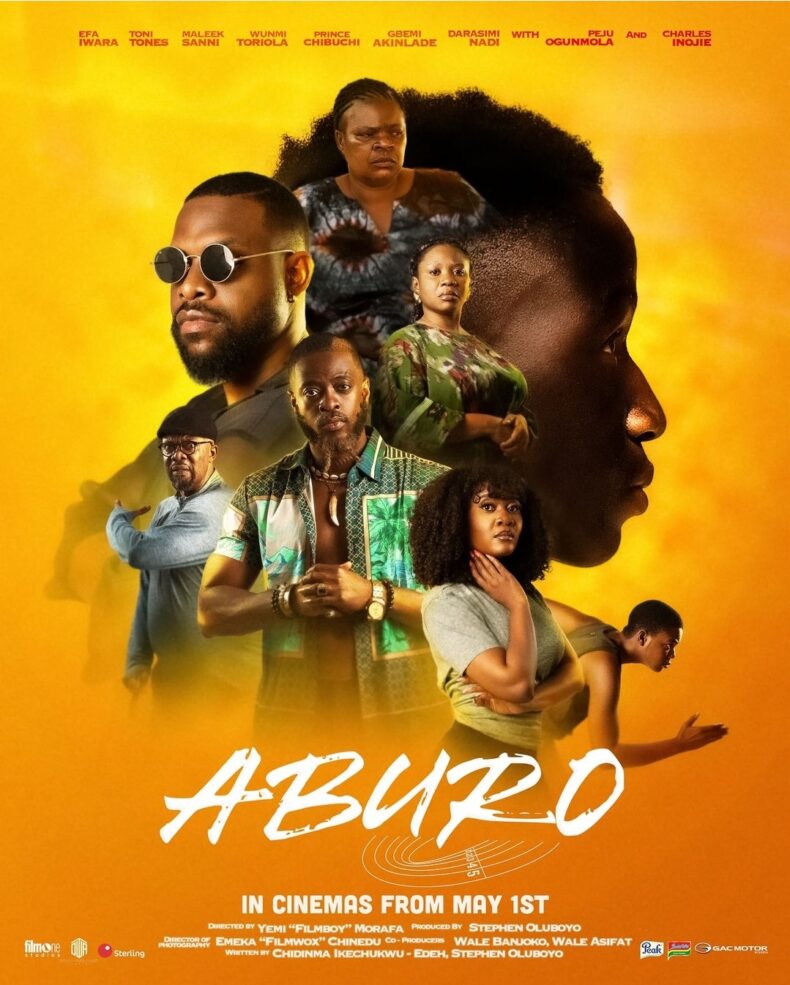Aburo
Yemi Cregx, Maleek Sanni, Darasimi Nadi, Prince Buchi Unigwe, Gbemi Akinlade, Wumi Toriola, Efa Iwara, Charles Inojie, Toni Tones, Peju Ogunmola
Aburo tells the story of its titular character, a street smart boy who's skilled at stealing because of his speed. When he steals from Mide, a failed international athlete, their lives intersect as Mide takes on the role of mentor, guiding the young boy towards a new path in athletics.
2hrs
Yemi Filmboy Morafa
Stephen Oluboyo
Franca Ikoko
2024
The familial elements
The plot, cast performances, and technical issues
Aburo tells the story of its titular character, a street smart boy who’s skilled at stealing because of his speed. When he steals from Mide, a failed international athlete, their lives intersect as Mide takes on the role of mentor, guiding the young boy towards a new path in athletics.
Aburo attempts to incorporate multiple storylines and fails to excel at any. Beginning with a streetwise thief, it introduces a former athlete seeking redemption, intertwining a love story, familial conflicts, sports rivalries, and even a subplot involving a mob boss. With all of these, it’s evident that Aburo lacks direction and is grasping at straws to provide a story. It would have been less egregious if one of these elements was adequately executed.
The love relationship between Edak and Mide (Played by Toni Tones and Efa Iwara respectively) has its moments, but as a whole, it is routine and uninspired. The movie tries to sell us on this romance by giving cute retorts and one liners, and arguments that start from nowhere and escalate exponentially, in the end, the relationship feels contrived and nothing more than cheap melodrama. The first confession of love from Mide to Edak was eye-roll-inducing, because there wasn’t anything to bank that confession on. Additionally, the on-screen chemistry between Efa Iwara and Toni Tones is lacking, further diminishing the impact of their romantic connection.
Mide is also an unsympathetic co-lead, his character becoming increasingly tiresome as the movie progresses. His motivations for sponsoring Aburo are selfish, lacking genuine care for the young protagonist despite the film’s attempts to suggest otherwise. Mide’s actions primarily serve as a coping mechanism for his own failure following his injury, projecting his own struggles onto Aburo rather than genuinely investing in his well-being.
The best narrative element Aburo possesses is the tension in Aburo’s family. The love between Aburo and his sister (played by Maleek Sanni and Darasimi Nadi respectively) is palpable and beautiful to watch, and this stems from the performance the young actors bring. There’s a way they are capable of bringing the best from one another, and it’s easy to ignore dialogue lines that aren’t properly delivered. Additionally, the complex dynamics between Aburo and his aunt (played by Wumi Toriola) add depth to this subplot. His thievery has made their relationship taut to the point that he’s been cast out of the house. Although not necessarily the best solution, as the Yoruba saying goes, ‘Eyan ko gbodo ju omo nù pelu omi iwẹ‘ (one shouldn’t throw away the child with the bath water), but it’s obvious his Aunt took this drastic measure to protect the other children from his negative influence.
Seeing how this familial element was a good inclusion, it’s a disservice to how the movie handles this. The movie needs his sister dead to act as fuel for Aburo’s rebellion against the mob lord but goes about it in an unconvincing manner. With Rofi sick, Aburo has to raise money for her treatment. There’s a montage of Aburo working to get money for Rofi’s treatment, but why will the producers and writers think this is remotely believable? Are we meant to accept that Mide, a rich man who needs Aburo, wouldn’t offer financial assistance? Or that Edak, a practicing doctor, wouldn’t provide medical care for Rofi? Or that Aburo wouldn’t resort to his thieving skills to secure a substantial sum for his sister’s treatment, stealing being something he’s efficient at, but he’d opt to do menial tasks like carrying loads for people for meager amounts?
Aside from its writing shortcomings, Aburo also suffers from technical deficiencies. We get scenes where the audio is echoed with no reason and to no effect. The transitions between scenes are also not seamless. Subtitles have spelling errors. Nollywood productions should also make their advert placements less intrusive, it’s off-putting watching a scene only to have an advert placement carelessly inserted.
The performances in Aburo fail to leave a lasting impression, with only a handful managing to stand out amidst the convoluted plot. Maleek Sanni and Darasimi Nadi (the young actors) for the most part deliver good performances. Efa Iwara’s act leaves one conflicted as to whether the lack of connection is solely because of his character or his portrayal. Toni Tones heavily relies on eye rolls and pursed lips and offers an overwrought sassy performance, this is a far cry from her best offering. We get a one note performance from Yemi Cregx as the villain in Aburo. However, in this mix of varied performances, Wumi Toriola shines in her portrayal. Her performance is measured, effective, and believable; this should undoubtedly pave the way for more significant roles for her in the future.
In conclusion, for a movie about running, there’s less running and more melodrama. It struggles to find its footing amidst a plethora of narrative threads and technical shortcomings. Aburo ultimately offers glimpses of potential but falls short of delivering a cohesive and compelling experience.









I don’t think it’s a great movie. Toni Tones called Aburo Maleek in one scene and I wonder why they didn’t reshoot. It was also really weird that Aburo didn’t ask Edak or Mide for help when his sister was extremely ill. Wumi Toriola was super believable and I will like to see her more on my screen.
Oh my goodness! The things that we let slide in our movies though 😞